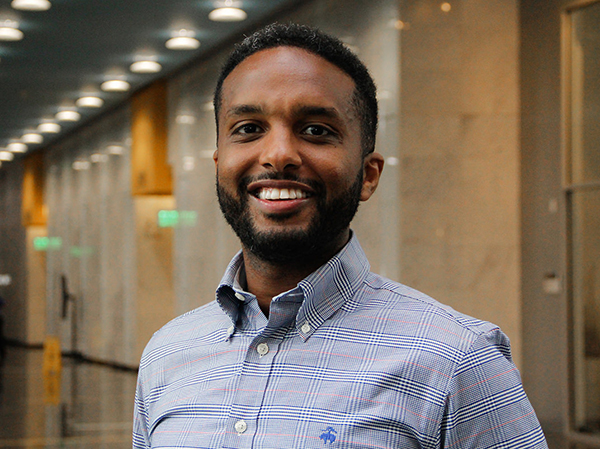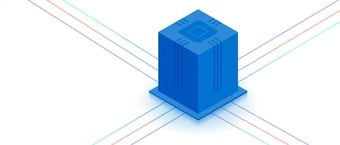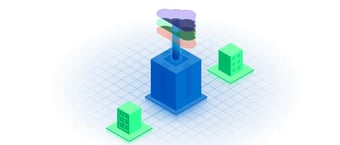
Growing Up in the Data Center Industry
Research says that the average worker will change jobs approximately 12 times throughout their career. But Brouk Eshetu wasn’t interested in being a statistic. He wanted to find an organization whose industry, work and culture could hold his interest and provide long-term professional and personal growth opportunities.
Now the Assistant General Manager for CoreSite’s Mid-Atlantic Region, which includes the Northern Virginia, Washington, D.C and Miami markets, Brouk shared his experiences, insights about the industry, and best advice for building a similarly successful and rewarding career in the data center world.

CoreSite: What does a Regional Assistant General Manager for CoreSite do?
Brouk Eshetu: My responsibilities as an Assistant General Manager are vast and varied. Essentially, I’m am responsible for helping the senior leadership team develop and crystalize the strategic and tactical plans for the market, and be on the front lines to oversee the execution of those plans. This includes responsibilities such as strategically driving both, sales activities to support the top line revenue growth for the data centers and operational efficiency in our data centers to ultimately ensure that our investments provide good returns to our shareholders. Additionally, from a market development perspective, the GM is responsible for understanding the competitive landscape of each market, having a clear picture of the supply and demand dynamics, as well as having a detailed plan and outlook on the inventory and capacity management of each facility in order to lead the development lifecycle and process. This process includes working with senior leadership to get new developments approved and phased appropriately, coordinating with sales leadership and finance to underwrite our sales forecast, as well as assisting the engineering and construction teams on the design and construction process of our facilities.
CS: Not many people specifically target the data center industry as their ideal career path. What attracted you to this line of work?
BE: I didn’t specifically target the industry when I joined CoreSite, but once I got into the industry and understood what our data centers and products enabled, I found it fascinating and realized that this was an industry with tremendous growth prospects. If you think about the digital content, streaming services, communications applications, and all the other technologies that have emerged in the “Information Age”, they are very relevant in our day-to-day lives. Not many people have an opportunity to see the technology and work with the people that allow all these apps and services to work the way they do. I think that’s pretty neat. And the fast pace of technological changes and innovation within the industry make it such a dynamic and exciting world to be part of.
CS: It sounds like you have a lot of responsibility. How did you get this kind of job?
BE: It was a long, somewhat winding road. My educational background is in finance but I began my data center career in product and marketing as an analyst in 2012. I got my feet wet by conducting market and competitive intelligence, and using that information to help develop our corporate product portfolio, go-to-market strategies, competitive positioning, market development plans, pricing, and other core tasks.
After that, I transitioned to a role within the finance group, where I had various positions in financial planning and analysis, and strategic finance. In my five years within the group, I learned a tremendous amount about the data center REIT industry, and financial reporting, budgeting, and forecasting for a publically traded company. These roles gave me a strong understanding of our business fundamentals from the granular level, such as product line profitability and line item expense budgeting, to the big picture such as helping senior leadership plan our capital investment cycles, and modeling the underwriting of large data center developments. Eventually, the confluence of my experiences within product and finance led me to the role I have today.
CS: What were some of the biggest challenges you faced as you worked your way up in the organization and undertook this new role?
BE: The biggest challenge was marrying the conceptual aspects of the business with the concrete, physical and technical world you encounter when you’re actually working in the datacenter. When you’re working in product marketing or finance, you see things from a 30,000 foot view. You understand in theory how everything works, why it costs what it does, and how it benefits customers and end users. But moving from that into the day-to-day of being involved in sales, customer service, and operations helps you actually understand not only how a data center operates, but also helps you appreciate the complexity and human expertise, teamwork and dedication that is involved in the successful deployment of a customer. It wasn’t till I was able to see both sides that I began to fully appreciate the complexity of running a business like this.
CS: What role did your friends and colleagues at CoreSite play in reaching your current role?
BE: I think CoreSite’s company culture played a huge role in my career path. The company does a tremendous job of pushing employees to be curious, explore opportunities, and work outside of their comfort zone because that’s where both personal and professional growth happen. And CoreSite’s culture of promotion from within and encouraging growth is largely responsible for where I am today.
I was also fortunate to have had, and continue to have, tremendous mentors from different parts of the company. Without their willingness to spend the time to share their knowledge and educate me, I don’t think I would have envisioned and been able to actually undertake a role that requires such varied responsibilities.
Beyond that, CoreSite is also strongly committed to cross-training general managers and assistant GMs. Every region has its own GM, who collectively have diverse backgrounds and a wide range of experiences and knowledge. We meet every two weeks to share company updates and we get together for quarterly workshops where we exchange ideas, ask questions, and learn from one another.
CS: Yours is a great story of success. What advice would you offer to someone else about how they can build a successful, sustainable, and fulfilling career in the data center space?
BE: I think two keys to forging a successful career path in this industry are curiosity and dedication. It’s imperative to understand the fundamentals of your business and the services and products your company offers. It is a complex and ever evolving industry, so you have to stay curious about what your customers need, how your products helps address those needs, and then learn how the solutions actually work from a technical perspective so you really get the whole picture. The other key is to seek new ways to contribute to the company, and that might mean having the willingness to get out of your comfort zone and learn how other teams outside of your department work and begin connecting the dots about how your work impacts theirs and vice versa.










